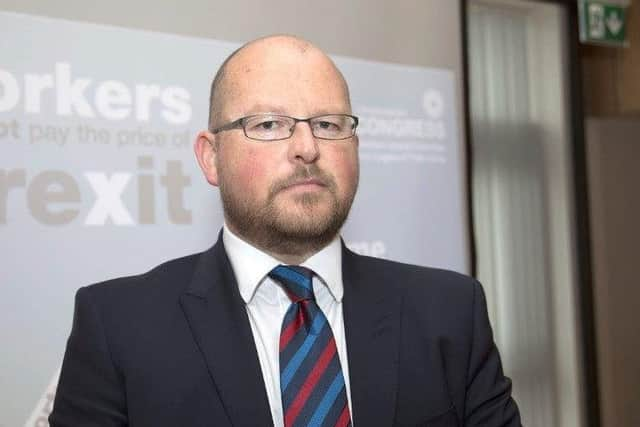ICTU: In absence of devolution, Northern Ireland needs a Stakeholder Forum to examine Brexit


It remains to be seen whether we stumble out in a chaotic manner despite the fact that it seems the majority of the House of Commons do not wish for this, or whether the UK leaves with some collective agreement and a transition period that seeks to manage the exit.
We in Northern Ireland cannot afford to be sidelined while in Westminster decisions are being taken (or not taken!) which will affect every family for decades to come.
Advertisement
Hide AdAdvertisement
Hide AdWe need a new approach to mitigate the situation we have been forced into.


While the commentariat, politicians and those of us leading representative organisations have been talking, planning and worrying about Brexit and its ramifications for some time, the potential reality of a ‘No Deal’ Brexit is now beginning to be articulated in its most brutal form.
Brexiteers argue this is scaremongering and it will be ‘alright on the night’. However, the reality is real uncertainty and this in itself creates a sense of chaos.
As a trade unionist with many years’ experience of negotiations I have been struck by the coherence of the EU 27 under the lead negotiator Michel Barnier.
Advertisement
Hide AdAdvertisement
Hide AdThe EU 27 is made up of governments on the centre right, the centre left and indeed the populist right. Countries from northern ‘protestant’ Europe and southern mediterranean ‘catholic’ Europe and the ‘newer’ eastern European member states.
Countries with varying political cultures and traditions. Contrast this with the incoherent and inconsistent approach of the Tory party, where on this issue of Brexit, there are a number of Tory parties.
Regrettably, the opposition Labour party seems equally divided on this critical issue of our time.
In Northern Ireland, a return to devolution seems as far away as ever.
Advertisement
Hide AdAdvertisement
Hide AdStormont has been in abeyance for two years with the people suffering the practical consequences of this limbo.
The Brexit debate here in political circles seems to be limited to the rhetoric of orange and green, with some notable exceptions.
The draft Withdrawal Agreement which commentators have lazily been describing as ‘Mrs May’s deal’ (it is not Mrs May’s deal but a proposal negotiated between the UK government and the EU 27) was rejected last night largely because of ‘British’ political concerns and clearly has not taken into account the overall impact a ‘No Deal’ Brexit would have on these islands politically, economically, socially and culturally.
The Irish Congress of Trade Unions (ICTU) which organises and represents 800,000 workers across the island through our 34 affiliate trade unions came to the reluctant conclusion at our executive meeting in November 2018 that the deal should, (in the absence of an alternative) be supported.
Advertisement
Hide AdAdvertisement
Hide AdWe did so not on the basis that this proposal, while clearly inferior to the status quo (of full membership of the EU), would do less harm to workers in Ballymena and Belfast and Dublin and Cork, than a ‘No Deal’ Brexit.
It now remains to be seen if the UK political establishment has the capacity and indeed the wit to get its act together and avoid what the majority of politicians and those of us who also represent real people in representative organisations want, which is an agreement between the UK and EU (if there has to be a Brexit at all).
In Northern Ireland there has been much comment in recent times about business groups and farmers speaking out. The trade union movement has always spoken out (albeit we are not always heard). There is a new assertiveness to the representatives of civil society, which is welcome.
I believe it is crucial now that under strand 3 of the Belfast/Good Friday Agreement, that the UK and Irish governments establish a representative Northern Ireland Brexit Stakeholder Forum without delay which includes the trade union movement (we represent 200,000 workers and their families’ interests in NI), the key business groups, the farming community and the community and voluntary sector.
Advertisement
Hide AdAdvertisement
Hide AdThese four pillars represent the overwhelming majority of citizens in Northern Ireland society.
Deal or no deal, if Brexit does occur on the 29th March 2019 there will be major issues impacting on Northern Ireland and its people some foreseen some unforeseen. We must seek to address these issues collectively and in a considered manner.
We want Stormont to return. We have always been and remain supporters of devolution. But we cannot wait any longer, our voices need to be articulated, heard and heeded in a coherent way.
Such a Brexit stakeholder’s forum is not in any way proposed as a substitute for devolution. Politicians are elected and accountable to their electorate and have a mandate.
Advertisement
Hide AdAdvertisement
Hide AdSuch a forum that I am proposing would actually complement devolution, when and if it returns. But we cannot wait as the 29th March 2019 is 72 days away and the clock is ticking.
We need to act now.
• Owen Reidy is ICTU assistant general secretary